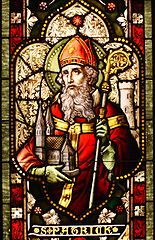
The Life And Writings Of Saint Patrick -Saint Patrick
IV.—PATRICK FOUNDS THE CHURCH OF BRIGHT
Only one of his missionary expeditions during this period is specially referred to; that is, his founding of the Church of Bright. He went, as we are told, from Saul southwards to preach to Ross, the son of Trichem and brother of Dichu. He dwelt at Durlus—the Strong Fort—to the south of Downpatrick, ‘where stands to-day the small city of Brechtan—that is, Bright.’ It is called a cathair, or city, because Patrick placed there Bishop Loarn, who is described in Latin as the man who had the courage to blame Patrick for harshly driving away a boy who was playing near his church, and possibly disturbing the solemnity of public worship. Of Bishop Loarn of Bright we know nothing else, except that he was a disciple of Patrick and Bishop of Bright. He was, doubtless, one of the household or family of twenty-four disciples who accompanied the Saint from the Continent. The name, however, is a Gaelic name, but this would not prove that he was trained on the Continent for the Irish mission, for there were certainly many Christians and some priests in Ireland before the arrival of St. Patrick in 432. It is unlikely, however, there were any such in Uladh at this time.
The old Church of Bright has completely disappeared. It was situated four miles south of Downpatrick, and about one mile from the sea, in the centre of a small but very interesting parish, of which O’Laverty gives a full and interesting account. Derlus, or Durlus, as it is more commonly written—the Stronghold of Ros—was the place now occupied by the Castle of Bright. Of this Ros, son of Trichem, who dwelt at Durlus, there is a curious story told in the Third Life. He was not pleased that his brother Dichu had become a disciple of Patrick, and when Patrick went to Durlus to visit Ros, ‘he fought against the Saint and refused to believe.’ Now, Ros was very old; so Patrick said to him:
“Why do you strive for this life, which is failing you, and neglect the life to come? All your senses are failing—your eyes are getting blind, your ears are growing deaf, your tongue stutters, and your teeth are falling out—all your members are going. If anyone made you young again, would you believe in him?”
“Yes,” replied the old chief. “If anyone gave me back my youth I would believe with my whole heart.”
Then, by the prayer of Patrick, Ros received his youth, the youth of a brave and handsome man, and forthwith he believed and was baptised with three other sons of Trichem, his brothers; and many others also were baptised along with them. It seems, too, that the faith of Ros was fervent and genuine. As he said, he believed with his whole heart, for when Patrick asked him if now he would prefer to live long on earth or go at once to heaven, he replied: “I prefer to go at once to the life eternal,” and immediately having received the Sacrifice—that is, the Holy Communion—he went to his Lord.
This story will have to be examined more carefully hereafter, when we come to consider who was Ros, one of the Nine appointed by St. Patrick to reform the Brehon Code. If the Ros named amongst them be the Ros, son of Trichem of Lecale, we must reject the foregoing tale as a later invention utterly unworthy of credence, seeing that the chieftain in question must have lived for at least seven years longer if he took a part in the purification and codification of the Brehon Laws.
Another interesting occurrence took place during Patrick’s stay through this winter in Lecale. On one occasion, going his way, perhaps to Bright, he saw a tender vouth herding swine. Mochae was his name. Patrick instructed him first, then baptised and tonsured him. He also gave him a Gospel and a menistir, as it is called in Irish, that is, the requisites of the ministerium or the due celebration of Mass. At another time, but of course later on, he gave him a crozier, which fell from heaven, its head falling in Patrick’s bosom, and its foot in Mochae’s bosom, that is, it fell between them as they sat, indicating that Patrick was to give it to Mochae, which he did, thereby investing him with episcopal authority. The crozier thus marvellously given was called the Etech, or ‘winged’ crozier of Mochae of Noendrum. In token of submission and obedience, Mochae promised to Patrick, and to his church, a ‘shaven’ pig, that is, the cleaned carcase, every year, and ‘the same is still offered,’ but whether to Patrick’s Community at Saul or Armagh is not stated in the Tripartite.

 Keep Site Running
Keep Site Running